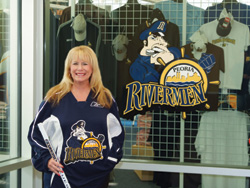
Griffith is a current member of the Advisory Council for Bradley University’s College of Education and Health Sciences and an original member of the Braves Scholarship Society, which helps support Bradley athletes. In the past, she was an active volunteer with Susan G. Komen Race For the Cure, Junior League of Peoria and the St. Jude Midwest Affiliate.
In her spare time, Griffith enjoys jet skiing on the Illinois River, but notes that Asian carp have made this hobby a bit more dangerous in the past few years. She is also an avid swimmer and tries to get to the pool every day. When time and weather permit, Griffith also spends time on the golf course. She uses her basement wine cellar as an excuse to collect wines in pursuit of the “jewel” of all wines at an affordable price and says that “wine is best experienced with friends!”
Tell us about your background and education.
I was born and raised in Peoria and have known no other home. For generations, my family has been proud to call Peoria home. My grandmother’s roots go back to the Leisy Brewing Company. In the 1850s, my Leisy ancestors came over from Germany, where they were farmers, to become “beer barons” in America. They settled in Keokuk, Iowa, where, in 1884, laws were passed which prohibited the manufacturing of beer. This precipitated a move to Peoria, at that time the second largest city in the state. Three Leisy brothers established The Leisy Brewing Company in 1892. My great-grandfather Edward, the president of Leisy Brewing Company, was credited with turning the company into a brewery of “superior” beer. In its heyday, the brewery produced 100,000 barrels of beer annually. Then prohibition struck. After that, the Leisy Brewing Company produced soft drinks, but not too much success. It just wasn’t the same as producing high-quality beer. In 1930, the brewery was sold to Premier Malt Company, which later merged with Pabst Brewing Company. For three generations, the Leisys brewed premium beer. I even have an unopened bottle of Leisy beer which will be passed on to future generations. My brother’s office is filled with Leisy memorabilia. We are proud of our “beer brewer” roots.
I was born at Saint Francis Hospital in Peoria and attended St. Thomas Grade School in Peoria Heights. My high school years were spent in Springfield, Mass., at the MacDuffie School. (I have come full-circle with Springfield, as that is where the American Hockey League offices are located.) For college, I decided to go for a change of scenery and attended Southern Methodist University in Dallas, where I graduated with a bachelor’s degree in business administration in three and a half years. In the fall of 1976, I left for St. Louis to receive my master’s of business administration from Washington University. My goal was to attend schools in different parts of the country and get to know people with lifestyles unique to their region.
Graduate school was my first experience in a totally male-dominated environment, although I did have a business professor at SMU who made it known that you would do better in his class if you were male. Such remarks made me more determined than ever. My father had received his MBA, so I was going to get my MBA. I was one of a handful of women in the MBA program, let alone to graduate with a degree. Once again, I had come full-circle with a city, as St. Louis is the home of our parent team, the St. Louis Blues. My first professional hockey game was watching the Blues at the Purina Arena. I never dreamed I would become associated with them. Now we are all family!
After graduating from Washington University, I went to work for a couple of years at what was Commercial National Bank (now National City) in downtown Peoria. I had previously worked at Prospect National Bank for a couple of summers and one Christmas. I wanted to live and raise my family back in Peoria. At Commercial Bank, I went through the management training program, which gave me the ability to work in each department. The training educated me about all functions in each division of banking, and I went from working with bank tellers to helping to analyze bank loans. I ended up working with pension and profit sharing plans in the trust department.
In 1984, my father decided it was time for my brother and me to learn the family business, Lincoln Farm Corporation. We are grain farmers, mostly in corn and soybeans, and manage farmland located throughout central Illinois.
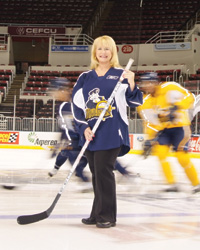 How did your career path lead to your current position with the Peoria Rivermen?
How did your career path lead to your current position with the Peoria Rivermen?
My education gave me the tools to be a business owner. I could have gone into any business with my background, as I now understand all facets of running a business. It was my heart that led me to the hockey world. I always say that I am the number-one fan of the Peoria Rivermen. I cannot imagine a winter in Peoria without professional hockey, as it is important to my family and community. Rivermen games are a good and safe place for families, and you cannot beat the entertainment! I am proud to have been able to bring professional hockey to Peoria.
How did you become co-owner of the Rivermen with Bruce Saurs?
Last year, Peoria celebrated the 25th anniversary of its participation in professional hockey. Bruce Saurs has been in the hockey business for over 20 years. Thirteen years ago, he announced that he was moving his International Hockey League team to San Antonio, Tex.
I had been a season ticket holder since the Rivermen won the Turner Cup in 1991. My children had grown up at the games, and our family always looked forward to the hockey season. Attending the games was a Griffith family tradition, and I could not imagine a winter in Peoria without hockey!
After considerable thought, Bruce, his son, Tim, and I purchased an AA hockey team in the ECHL in our commitment to keeping hockey in Peoria. We kept the Rivermen name and logo. My first game as owner of a professional hockey team was in October 1996. I really wanted fans to have the opportunity to experience the Rivermen hockey I had grown so fond of.
Is it difficult to make business decisions having more than one owner?
I have always said that Bruce has the hockey knowledge and I have the fan knowledge. After attending my first league meeting, I realized how lucky I was to have Bruce as my partner. It seemed like he knew everyone in the business. He is highly respected and has been a wonderful mentor for me. We work well together as his strengths are my weaknesses and vice versa, and we have the same goal—to put the best hockey on the ice in Peoria.
How do you and Bruce divide responsibilities?
I am fortunate that Bruce and I think alike. I have always taken what I call a “family” approach to all of my business. Anyone involved in business with me is considered family. I treat my employees as I would like to be treated—with respect. I have high expectations of people who work for me, and I want each person to live up to his/her ability. I also want my employees to enjoy their jobs. My father taught me to surround myself with only the best people in any business, and I am very lucky to have been able to do that with both the Rivermen staff as well as the Lincoln Farm Corporation.
Bruce and I have been on the same page since our partnership began over 13 years ago. The only area in which we divide responsibilities is the amount of time spent in the Rivermen office. Bruce is in the front office every day, which allows me to focus on the farms. We make all decisions together; I do not remember a time when we disagreed. Bart Rogers, our president, is responsible for daily operations, and I am proud to have him as part of our “family.”
How much time do you spend in the office as an owner?
I am lucky to have one of the best front offices in the league. My staff allows me to put the best family-oriented hockey on the ice. We do the majority of our season ticket and corporate sponsorship renewals during the summer. Since Bruce is in the office every day, I try to stop in the office at least a couple of times each week. I am always available for in-house meetings and corporate sales calls. Thank goodness for cell phones and email! I receive daily emails from Bart and the staff and am only a phone call away if something should come up.
Each September, when the season begins, I spend more time in the office. I like to attend a couple of team practices each week, and I never miss a home game! I love watching hockey and I like seeing my players play well and advance to the next level. I tell my players that they will always be part of the Rivermen family, no matter what jersey they wear. In the first period, I sit in the press box with Bruce to catch up on any business which might need our attention.
My goal is to visit a few new arenas each season so I can get an idea of what other teams are doing. I am always looking for new promotions and continually look for ways to improve the fan’s experience. This year we have two new cities to visit—Rockford and the Quad Cities. I plan to visit each city a few times, as well as attend games in Milwaukee and Chicago.
What is it like to be a woman in a male-dominated industry?
At first, it was intimidating to be in a male-dominated industry. I am usually the only female owner at league meetings, and according to former Rivermen broadcaster Norm Ulrich, I am one of only a handful of women in professional sports ownership. 52 percent of our fans are women, and 50 percent of my sales front office are women. As women become a bigger percentage of the fan base, opportunities will open up for women to become more involved in the management of this male-dominated industry.
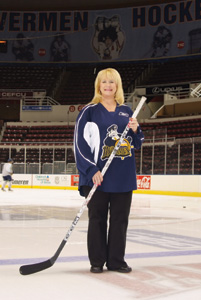 What do you enjoy the most about your position as owner of a hockey team? The least?
What do you enjoy the most about your position as owner of a hockey team? The least?
I don’t like to lose games; I love to win games! Although I know it’s not possible, I continually ask the coaches why we can’t win them all. I don’t mind losing a game if the players did their best. However, if it is a sloppy game, I find no excuse for that. The AHL is the second-best league in the country. The players are professionals, after all, and hockey is their job. I want my players to be the best they can be and to go to the NHL. I want my fans to feel like they have gotten their money’s worth.
What major changes have you made to the franchise?
I began my hockey experience in 1996 by purchasing an ECHL (East Coast Hockey League) team with Bruce and Tim Saurs. This was a step down from Bruce’s IHL (International Hockey League) team, which he moved to San Antonio. The ECHL was an “AA” league, a development league for the AHL and NHL. Peoria and its fans were used to a higher level of hockey. The skill level and skating abilities of the players were not what they were used to watching.
Peoria was spoiled by Bruce’s IHL team. Some of the greatest goalies in hockey, such as Curtis Joseph, played in Peoria. Tony Twist and Kelly Chase are still fan favorites. The IHL team brought two Turner Cups home and established many hockey records which still stand today. My favorite is having the longest winning streak in professional hockey. I have faith that the Rivermen will break that record this year under the direction of Coach Baseggio.
In 2004, we grabbed the opportunity to return to our IHL glory days. Bruce and I purchased the Worchester Ice Cats—the AHL affiliate of the St. Louis Blues—from the Blues. St. Louis owned their farm team. We moved the team to Peoria, folded our ECHL team and became the AHL affiliate of the Blues. It made sense for both Peoria and St. Louis, as we are only a quick drive away. There are no long plane rides for players, and if an emergency call-up is necessary, the player can be in St. Louis in no time. Also, at this level, a player can be on the ice on Friday night in Peoria and playing hockey on national television for the Blues on Saturday.
I take great pride in watching my players advance to the next level. I also take great pride in advancing the level of hockey in Peoria. There are only 28 other cities that can boast of having an NHL farm team. It’s a feather in our cap! It gives the fans of Peoria great bragging rights in the world of professional sports. The Rivermen are also good for our local economy, bringing many dollars to the region.
What is a typical game day like for you?
I am lucky that the majority of my home games are on the weekends. Not counting the preseason games, I have eight weekday games and 32 weekend games. A typical Saturday game day would begin with a morning visit to the arena to watch the practices for both teams. Games are at 7 p.m., and doors open at 6 p.m. If someone from the Blues’ management team is in town, Bruce and I might meet them for a pre-game dinner. If not, both Bruce and I like to be there when the doors open. It gives us a chance to walk around the concourse to make sure everything is in order. This also gives the fans a chance to address any questions they might have in regards to their hockey experience with us.
Bruce and I then head up to press box, where we meet with any NHL scouts who are in attendance. Local general managers also like to follow their teams. The whole hockey family is always looking to improve the hockey experience. I expect more NHL scouts this year because the Rivermen players and team will be better than they were in the past. Who knows—we might have to expand the press box to accommodate everyone! We never know who will be in attendance, from scouts to Blues management to past players. Last year, we even had Andy Murray, the head coach of the St. Louis Blues, in attendance at a couple of games. It showed the Rivermen how committed the Blues were to the team.
I sit in the press box for the first period of each game, then I like to walk around the concourse and visit with the fans. My favorite night is when we have a jersey auction. I always wear that night’s jersey around so fans can get a close look at what they’re bidding for—sometimes it is hard to see them on the ice. I also help out on the ice after the game for the post-game jersey auction. After the game, Bruce will head to the locker room. This year I will head up to the post-game radio show in the club room. We will then meet up for dinner and discuss the game. I don’t like to eat before a game because I get too nervous!
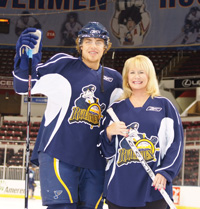 What is one of your most rewarding successes that you would like to share?
What is one of your most rewarding successes that you would like to share?
In July 1999, I hired my first coach. I had inherited Mark Reeds from Bruce’s IHL team in 1996. When he moved on in ’99, we were faced with finding a replacement.
Don Granato came in for an interview. I’ll never forget that I was the last to visit with him. I thought to myself, “What do I ask a coach?” I had never played hockey. I could figure-skate in my younger days, but that was about as close as I got to hockey. But Don had one question for me—“What did I want from my coach?” That was easy. I wanted three things: The first was having my own goalie that played only for Peoria. I was tired of losing my favorite goalie mid-season to call ups. The second wish was having a hockey player who was a good fighter. I love hockey fights. My fans love fights. However, what I wanted most was a championship ring. I wanted to win the Kelly Cup, preferably in Peoria. We hired Don Granato and I got my three wishes!
My most rewarding success was winning the Kelly Cup Championship on May 31, 2000, against the Louisiana Ice Gators. After losing the first two games of the “best-of-seven” series at home, we headed to the Cajundome, where they had won 21 straight home games. We won all three games in Lafayette, taking them from a near-sellout (14,000 seats) to nearly no one in the stands. Louisiana was so confident that they were going to win the Cup that they had started to sell their championship t-shirts. My Rivermen did not appreciate that. The players made up for the skills they lacked on the ice with their hearts and true grit. The team was more determined to win that Cup than ever. They forced the series back home, where we won game six to take the Cup with four straight wins. Nearly 8,000 fans cheered the Rivermen to victory that Wednesday night. Coach Granato came through for me and my fans! It’s a night I will never forget. I still get goose bumps thinking about it. Drinking from the Kelly Cup was an all-time high! I even had a replica of the Kelly Cup made for my home. I proudly wear my championship ring to league meetings.
One of the Rivermen’s recent projects is to reinvent the fan experience. How have you done this?
I felt that over the last couple of years, with all the mayhem of moving into a new league and dealing with construction issues from the Civic Center expansion, we lost sight of what was important in maintaining our fan base. So last year, we established a fan advisory board to help us deal with the concerns of our fans. They were our troubleshooters who dealt with complaints from fans. We surveyed our fans to find out in which areas we were failing to provide a great hockey experience and learned that one major complaint was that the fans missed the close affiliation with the players. We asked St. Louis for help in this area, since they provide all players and coaching staff for the Rivermen.
In working closely with the St. Louis Blues, they signed Jean-Guy Trudel to an NHL/AHL contract. Trudel played for the Rivermen from 1996 to 1998 and is one of Peoria’s most popular players. His presence on and off the ice will be a tremendous boost to our fan base.
Coach Baseggio has also promised that the players will have a greater presence in the community. The Rivermen players and coaches realize the importance of community involvement. It is a win-win situation for everyone when there are more fans in the seats. Bruce and I are committed to enhancing the fan experience. President Bart Rogers has recently hired former player and fan favorite Tyler Rennette to join our front office staff. Rennette will be the Rivermen ambassador to the fans. After surveying the fans, we brought these two players back to rekindle the glory days of Rivermen hockey. Our goal is to provide our fans with the best hockey experience possible.
The St. Louis Blues further helped improve our fan experience by hiring a second assistant coach for the Rivermen players. Davis Payne, coach of the ECHL Alaska Aces, was hired this summer to provide help in the development of our players. Davis Payne was named ECHL Coach of the Year in 2006-07. His team won the Kelly Cup in the 2005- 06 season. He will join Head Coach Dave Baseggio and Assistant Coach Behind the Bench Brent Thompson. We have new uniforms for the players, were unveiled at our first home game. Our team and on-ice product will be better, making our fan experience better.
We continue to improve the fan experience by improving game operations and entertainment. At the first game we unveiled a new inflatable tunnel that the players will skate out of at the beginning of introductions. An eight foot inflatable version of The Captain will be our new mascot. Our opening video board show is new, and we have a new radio station, 96.5 ESPN Radio. The Doc and Kotter ESPN radio show will broadcast live from the new club room starting at 5 p.m. and continue until the pre-game show. Game time is 7 p.m.
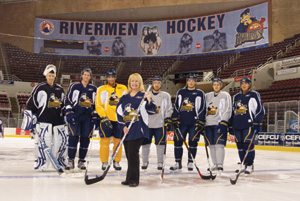 How has the Civic Center expansion impacted the Rivermen?
How has the Civic Center expansion impacted the Rivermen?
The expansion moved the Rivermen business office adjacent to the main box office and main entrance to the arena. Before the expansion, our offices and gift shop were located in the basement outside the club room. We now have greater visibility for anyone entering the Civic Center. Our expanded gift shop is right next to the main ticket booth, which allows easy access for fans to purchase tickets and merchandise. Off the concourse in the arena, two new food courts were added to provide a better dining experience. This will also give our die-hard fans who attend every game greater variety in their food selections and quicker service at intermissions. My favorite part of the expansion was the doubling of women’s restrooms in the arena—I hate to stand in line to use the restroom! We have a new club room located upstairs where our pre- and post-game radio shows will be held. Four new party suites were also added off the new club room, which will help improve our fan experience by the Civic Center improvements to the arena.
With which community organizations do you serve?
I currently sit on the Advisory Council for Bradley University’s College of Education and Health Sciences. The council meets twice a year to provide community insight and community input to the college, which focuses on providing both undergraduate and graduate programs for human service professions.
I am particularly interested in the teacher education and physical therapy departments. Physical therapy is an important aspect in the life of any professional athlete. The physical well-being of athletes is a major concern for anyone in the sports field from owner to player. As an owner or coach, you want your athletes to be in top physical form. Teachers train and educate the future leaders of our world.
I have strong ties with Bradley University. In 2004, I learned that an ancestor of mine was the first vice president of the Bradley Board of Trustees in 1896. When I was in college, I took summer classes in the business college at Bradley. I am also an original member of the Braves Scholarship Society, whose purpose is to help support Bradley athletes.
My community involvement continues today though the Rivermen. Thanks to a few generous corporate sponsors, we are able to provide non-profit organizations with tickets to the games. At almost every game, we have a group from the Children’s Home, the Children’s Hospital of Illinois or TCRC cheering the Rivermen on. We receive numerous requests for donations to various fundraisers and give what we can, whether it’s tickets or merchandise.
Please tell us about your long history of community service.
My past community board associations include St. Jude Midwest Affiliate, Susan G. Komen Memorial Chapter and the Junior League of Peoria. I was taught by my parents at an early age that it was important to give back to the community. I have done this by having a lifelong involvement in the non-profit sector.
My first volunteer experience was working with special needs children at Zellar when I was a teenager. I joined the Youth Farm League in 1980; Carmel Corn sales were our big fundraiser at that time. My first community board involvement was with the Youth Farm and Florence Crittenton boards in 1982. That began my community involvement, which has lasted for over 25 years. I have limited my volunteer commitments the last few years so I can concentrate on my children, the family business and the Rivermen. I feel that 25 years of volunteer service would make my ancestors proud.
My fondest memory of community involvement was the creation of the Susan G. Komen Memorial Chapter of Peoria. I had joined the Junior League of Peoria in 1976. As a Junior League member, I worked on the first couple of Race for the Cure races. The first race was in 1986, with almost 1,300 women participating. We knew it was a good beginning because Peoria was almost always the largest Race for the Cure in the country. We were extremely proud of the Peoria Race. Who would have thought that the local Race for the Cure would grow to 25,000 participants last year? The Race is another feather in Peoria’s cap. We should all be proud of it!
In 1993, four of us from the Junior League went to Dallas for the annual Susan G. Komen Foundation luncheon. Linda Washkuhn, Linda Maricle, Martha Schmitt and I were sitting in the lobby of our hotel discussing the future of the Race for the Cure. It was the practice of the Junior League to turn their projects over to the community after a few years. We could not think of any community organization that would take the race over. So, we decided to create one. Thus the Susan G. Komen Memorial Chapter was formed.
In 1994, the chapter ran their first Race for the Cure. The name has since been changed to The Peoria Memorial Affiliate of the Susan G. Komen for the Cure, but to me it is still the Komen Memorial Chapter and Race for the Cure. Through the generous support of corporate sponsors, the Rivermen were able to provide tickets to a game for Komen’s Kids Konnected program. The rest is history.
What personal goals would you like to achieve in the next ten years?
I would like to continue to provide a family-friendly hockey atmosphere, affordable ticket prices and at least one more Championship Cup ring for my collection. TPW
